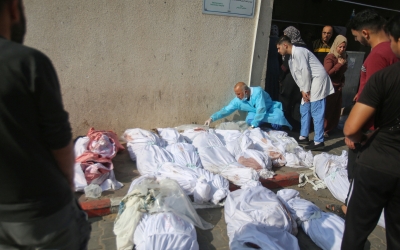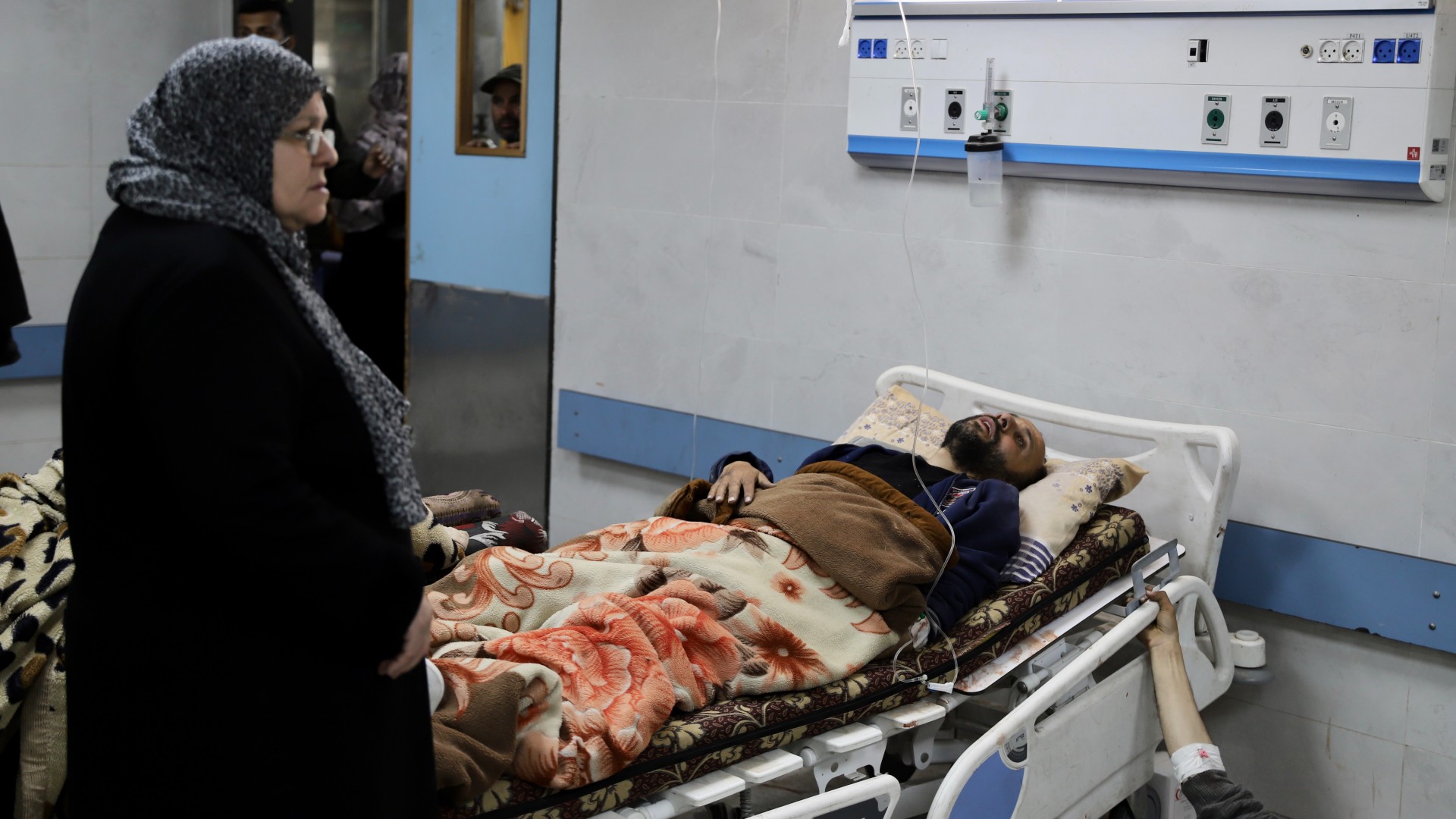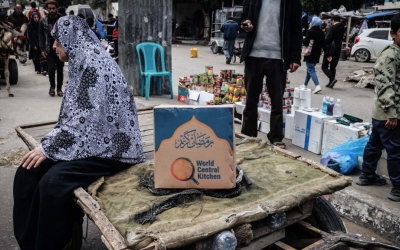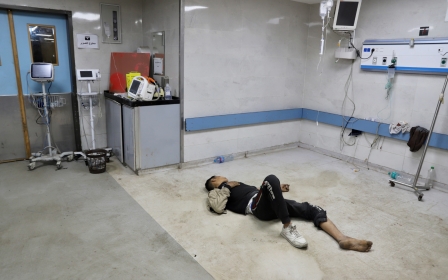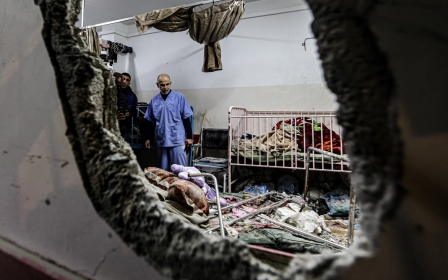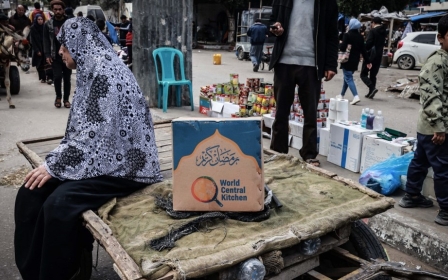Israel’s al-Shifa raid: What’s happening and how we got here
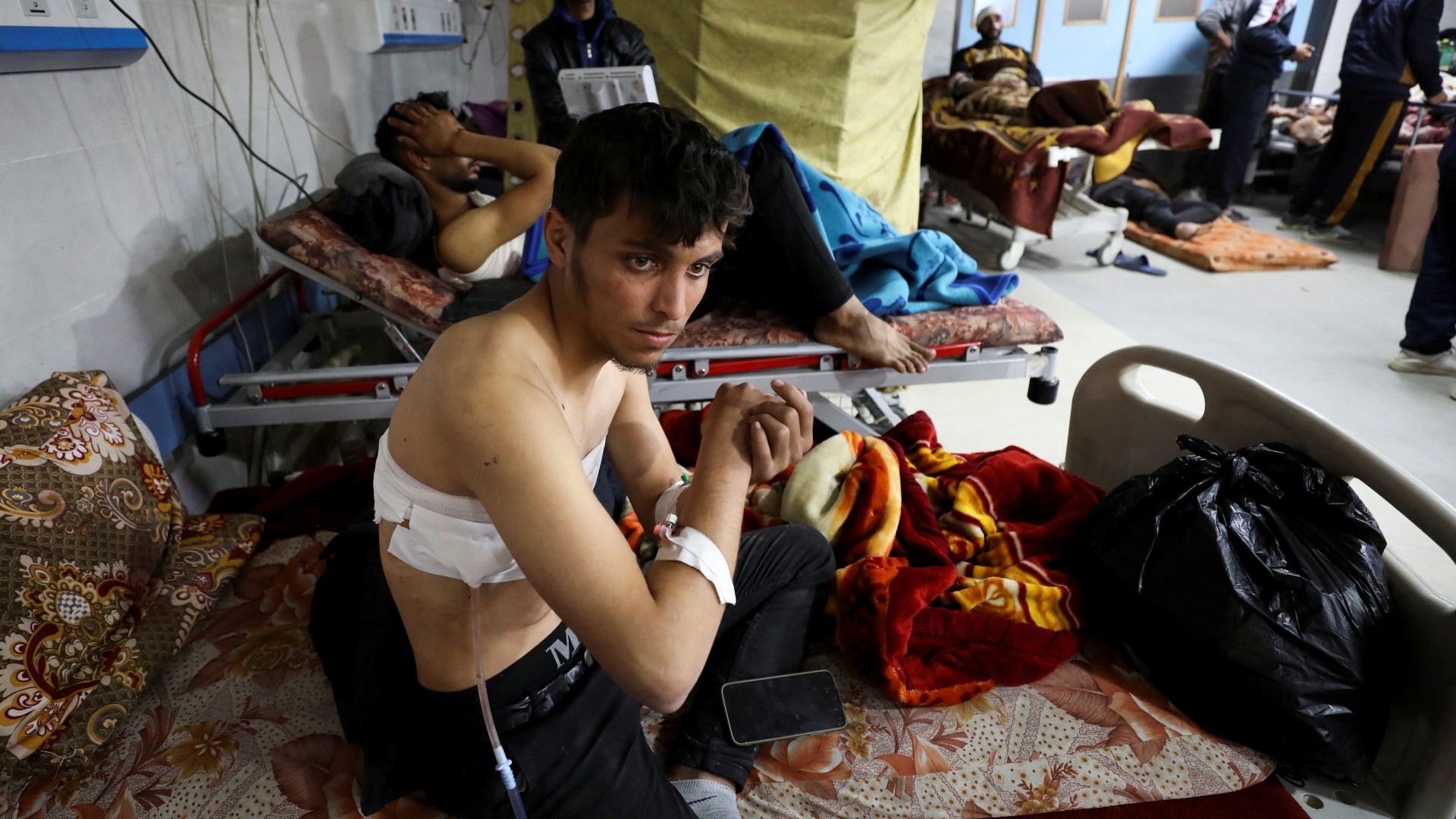
Around 30,000 Palestinians are currently under siege at Gaza City’s al-Shifa Hospital, following an overnight raid by the Israeli army on Monday.
The military launched the raid, with tanks advancing towards the hospital as they shelled it, just as Palestinians sheltering in the building were about to have their pre-dawn Ramadan meal before starting the day's fast.
Initial reports said that several people have been killed and wounded in the latest ongoing raid.
At least 80 people have been arrested during the night raid at the site that has been the centre of key events and attacks since the start of Israel’s war on Gaza.
The hospital is located in Gaza City, and is made up of a complex of buildings and courtyards, less than half a mile away from the Mediterranean coast.
New MEE newsletter: Jerusalem Dispatch
Sign up to get the latest insights and analysis on Israel-Palestine, alongside Turkey Unpacked and other MEE newsletters
Many of the displaced Palestinians sheltering in the hospital had been forced out of their homes from the Shati refugee camp and the Rimal neighbourhood, which sit at either side of the complex.
Despite the Geneva Conventions that forbid military operations against hospitals “unless they are used to commit, outside their humanitarian duties, acts harmful to the enemy,” this is not the first time the hospital has been raided.
What is the situation like now?
The situation in the hospital has already been described as “catastrophic” before the latest raid.
Thousands of people, with no homes to go back to, have sought refuge inside the hospital, with the number growing due to the attacks that are displacing people daily from nearby areas.
Recent Israeli attacks on nearby areas, including al-Rashid Street, Salah al-Din Street, and Kuwait Roundabout, where 118 people were killed and hundreds of others wounded as they waited for aid last week, have increased the number of displaced Palestinians at al-Shifa.
The hospital is barely functioning as a medical centre. There is little to no medicine or equipment, while the hospital currently relies on trainee doctors. Many tools such as x-rays and ultrasounds cannot be used due to the lack of electricity.
Bayan Sultan, a journalist on the ground who is living at the hospital, told Middle East Eye that at around 1pm on Saturday people heard sounds outside the building that they assumed were aid trucks being delivered.
However, half an hour later, the Israeli army ordered people sheltering in the hospital to leave, as Israeli forces bombed the area until around 5pm.
The bombing over the weekend destroyed a number of homes in al-Rimal neighbourhood, close to the hospital. On Monday afternoon, the area was covered in thick plumes of black smoke and ash.
The Israeli army arrested a number of journalists during the ongoing raid, including Al Jazeera's Ismail al-Ghoul, as well as destroying the broadcasting vehicles of press crews at the site.
The area has, once again, quickly become a danger zone, with the Israeli army dropping leaflets ordering residents in the al-Rimal neighbourhood to leave towards the south, where the majority of Gaza's population has been forced to relocate to.
Is this the first raid at the site?
Al-Shifa and its surrounds have been raided at least four times since the start of the war on 7 October, according to the Palestinian Ministry of Health.
The first raid on the hospital took place in early November, followed by another a few days later, with the Israeli military alleging that it housed a Hamas command centre beneath it.
On 11 November, Israeli fighter jets and tanks shelled the outside of the hospital, causing the surgery, the intensive care and paediatric departments to stop working.
Israeli forces encircled the hospital with patients, medical staff and around 15,000 displaced Palestinians still inside. Among those in the hospital were 36 premature babies and 22 intensive care patients.
Following the raid, several reports and investigations showed that the evidence produced by the Israeli army fell short of its claims that Hamas was operating from the site.
A BBC investigation found that videos of the Israeli army finding weapons in the hospital had been edited. It also said that footage of an Israeli army spokesperson showing the discovery of a bag containing a gun in the hospital had been filmed hours before the arrival of the journalists who he was showing it to.
Numerous investigations following the November raid found that Israeli and US accounts were not conclusive proof that Hamas was using the hospital, leading the UN High Commissioner Volker Turk to call for an independent investigation.
The general director of the Ministry of Health, doctor Munir al-Bursh, said that during the raid, Israeli soldiers used loudspeakers to order people out of al-Shifa, and around 30 people were taken to the courtyard, stripped of their clothes and blindfolded. A warehouse of medicine and medical equipment was also blown up.
How is it still functioning?
Al-Shifa hospital ceased to function after the November raid, gradually turning into a displacement shelter for Palestinians.
Since Israel has cut off all electricity, aid, fuel, water and food since 9 October, the hospital has been running on a limited number of generators.
According to Aurelie Godard, the head of Doctors Without Borders’ medical activities in Gaza, minimal shipments of fuel arrived in Gaza in an aid convoy in January that has kept the hospital afloat.
She added that the hospital is badly damaged and barely functional, with ceilings ripped open and IV bags hanging directly on the walls of the hospital.
Medical teams have managed to salvage equipment and keep the emergency room running with limited equipment. The staff, many of whom volunteers, have however not been able to re-open the intensive care unit.
There is a severe shortage of hospital beds, forcing some to share beds, while others sleep on the floor.
What’s behind the latest raid?
There has been much speculation and unconfirmed reports about the timing and reasoning behind the latest raid on the hospital.
The raid came at the same time as an Israeli delegation was expected to arrive in Qatar to review a Hamas ceasefire proposal.
The negotiations are set to be mediated by Egypt, and will need to be approved by Israeli Prime Minister Benjamin Netanyahu and Defence Minister Yoav Gallant, Israeli media reported.
Meanwhile, a Palestinian police general was also killed by Israeli forces on Monday morning. According to Al Jazeera, he was in charge of securing the entry of aid trucks into northern Gaza.
Citing unnamed sources, the Qatar-based network said Faiq Mabhouh, the director general of Gaza's police operations, was credited for the recent coordination between tribal leaders and Unrwa to secure and distribute aid coming from the south.
His efforts resulted in the safe entry of aid trucks for two nights in a row, following weeks of Israeli targeting of convoys and aid seekers.
The Israeli military said that Mabhouh was killed during an exchange of fire with troops during a raid on al-Shifa hospital and west Gaza City.
The killing comes after reports said that civilian tribes in Gaza, who rejected any cooperation with Israel regarding the distribution of aid, had recently met at the courtyard of the hospital.
In the meeting, the tribes said that they are willing to cooperate on the distribution of aid on the condition that it is done in collaboration with security services and government officials in Gaza.
The tribes met following Israeli media reports that detailed Israel’s plans to divide Gaza into areas governed by tribes, who would assume responsibility for distributing aid there.
Middle East Eye delivers independent and unrivalled coverage and analysis of the Middle East, North Africa and beyond. To learn more about republishing this content and the associated fees, please fill out this form. More about MEE can be found here.


